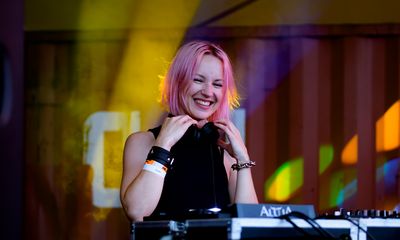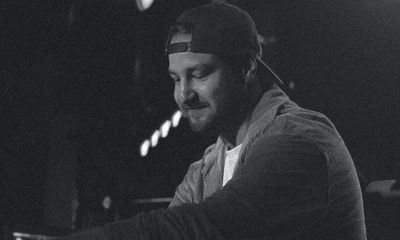dig dis!cover: Marc DePulse
You've really been in the music business for a long time. What was the biggest change for you?
I started in 1999, which is 23 years ago now. At that time I was 18 years old. The music at that time was super fast and more towards Hardstyle/Gabber. The biggest change for me was actually the way of production. Back then, everything was still done analog and the sequencers were MS-DOS based programs. Which means there weren't Windows/Macs systems back then, there was no mouse to use. I had everything running in MS-DOS mode with the Impulse Tracker so I operated everything through the keyboard. Nowadays it's extremely easy to produce music with a good DAW. Also you often resort to samples or have a few fixed loops that you always work with. Generally over the years you've built up a big portfolio of instruments, elements and tools that didn't exist back then. That's also why you can really do 5 to 10 productions in a month nowadays. 20 years ago a single production took so much longer.
That being said, do you think that the quality has decreased with the increasing number of releases every week?
Yes but especially the quantity has absolutely increased. Back then, you could get by with one release in half a year. Also the music was still pressed on vinyl. Of course artists and labels took more effort and more time to produce music because they knew that if they pressed it on vinyl, it really had to be a great release, a well selling record. Years ago you just paid a few thousand euros for like 3.000 vinyl copies. You think twice about that when planning a release. Today, you can literally just put out any shit. It doesn't cost anything except the mastering or some social PR. But those are all totally manageable costs. Of course, the possibilities that you have today through a computer are much higher today. And sure, when I listen to the stuff from the old days, even if it was analog, but these sounds are nowhere near as blatantly developed as the music today. There are two big differences: one, the music productions are better, and two, the music equipment is better. Both for music studios and also PA systems. And then I think to myself: This is of course a great advantage for today's generation, who directly start at an easy level with huge possibilities. You also don't have to have the absolute knowhow to produce music anymore. Much has become self-explanatory and thus the mass is of course always broader. But that’s not yet a promise to become a great artist and have a huge career. Hard work 24/7 will always be the key.
Did you start directly with electronic music back then?
I learned the accordion very early, in my earliest childhood, and of course it was used to do everything from folk music to Christmas carols. So it was basically learning the notes. That stuck with me. My parents still say today that I should do something with accordion in my productions. But no, I don't want to do that, it simply doesn't fit. I was already partying at an early age. So already at the age of 14 years, that was at that time 1994/95 I went to parties and the music was already very chart-focused. There were also underground clubs in my hometown, but at that time it was not my thing. I was more into Trance and Eurodance. Simply starting bigroom and diving into the subculture more and more later. The movement to the music I still make today started a few years later, around 2005/2006. Before I also worked as a ghost producer for years, producing mass of Hard-Trance and Hardstyle stuff for an Italian distribution. Honestly I only made it for the money, but I quickly realized that I didn’t really feel this kind of music anymore. Funny fact is that I still even receive money from GEMA for these older projects today. So the mass-production really did it back then for me and it used to be really profitable because I was doing vinyl too. Plus those Hardstyle records were really selling like 5.000 vinyl copies which was a really lucrative business. Especially when you consider that you always get even more with physical records through GEMA. Apart from that, electronic music has always determined my life since it existed. I grew up in the DDR (East Germany) and the music my parents listened to but everything that came after that, i.e. at the beginning of the 1990s, got me interested right away.
What were your musical idols?
Starting with Trance, the artists that inspired me were Pulsedriver, Kai Tracid, Cosmic Gate or Blank & Jones. Those were the beginnings of the 2000s. In the 1990’s it also started with Marusha and WestBam. These artists are still around today, funny enough, they stayed true to their music. For the music that I still do today, I got inspired later through a friend. His name is Dave Shokh and he completely infected me with this kind of music. It used to be called Electro House back then. Later it evolved into Minimal and Deep Minimal, Minimal House and so on. Things moved for me, also for my development. The music style I have been doing for the last few years is called Indie Dance. Who knows what these genres will be called in ten years. The beat was relatively similar to what I have always done, so between 120, 130 bpm and somehow always a bit 1980/90s retro vibed and that's a bit of what I associate and combine with my music today. There is no real guide on how to assign which track to which genre and partly it is a matter of interpretation.

How did it come to the foundation of the label JEAHMON! Records?
This label will be exactly ten years old in 2023. I found it back in 2012, but the first release came out in 2013, so there's officially something to celebrate next year. In the beginning I wanted to create a new brand. Both as an imprint and an artist alias with the same name. I knew from the beginning: This is my next level baby. I wanted to try something new and do something different than the things I started with. Right from the beginning, my approach was to bring out my own music, to press it on 12” and also make it a full cover vinyl. For that I had a graphic artist / painter from Belgium, who helped me with that. She also designed the great fish logo and generally had the idea with the fish, which has now been established as a brand for JEAHMON! Records. The first five records were completely full cover, which was of course also a cost factor. But at first it wasn't about that and we didn't have such a great output at the beginning either. So new music came out in intervals of half a year, I think as iit always took a little while to get the money together. The idea in general was always to be independent from sending music to other labels myself. I wanted to have the option to always release as Marc DePulse. And that really took me a few years. I started another label, called “Pimprinella” the same time, on which I have only ten releases and stopped it in 2014. Now I’m re-starting it and keeping the Housy-Melodic vibe for new releases in 2023. And then I had Westbalkonia as the third label imprint. However my focus is completely on JEAHMON!, also because it fits so well to my Marc DePulse style. Every single DJ set of mine is full of JEAHMON! tracks. Since Corona, a switch has flipped in my head that said: All or nothing. At the beginning of the pandemic, I asked myself: "What can I actually do in case it's not enough here? And can I somehow make myself financially independent?” And I realized: Sure, you can of course take any job anywhere, but the good is so close. I have a label and why don't I put it all on one card? And the thing is, I had basically always been with dig dis! but not directly affiliated, but for years with a sub-distributor. And since I have now switched completely to dig dis!, the switch went relatively easily and the whole back catalog was already there. Since then it has started to be profitable. Of course it's still such a heart-project and I don't just put stuff out for strategic reasons. I've always handled it in such a way that I only put out music that I really like 100%. Still, it has to be kept economical and that's what I’m trying to do right now and focus on in the future. Plus I can already announce, there will be a new brother for JEAHMON! from next year, a sub label called “JEAHMON! Redux". This imprint will include only 1-track-releases. Bangers only, focusing on the raw elements with pixelated cover artworks.
Why did you decide to join dig dis!?
I have known Frank Schreiner (founder of dig dis!) for many years. I actually don't remember how we got in touch, but we also talked on the phone quite often. I also work with your kompile! tool and Frank gave me a lot of possibilities back then. Since then I would say I have an attachment to dig dis! His son, Luca Schreiner, is also my label manager now and I've known them and their team for many years now. dig dis! has grown a lot since then and of course when I talk to artists who are thinking about starting something new and their own record label, I always try to bring in dig dis! as an option, so that they can take a look at it. I have also had colleagues here who have simply looked at it in my system and ask: How do I create a release now? How can I access the metadata? It's all such a cool system, I really like it. It's totally easy to work with. I think that's a huge advantage. Many things are self-explanatory. I've also been in contact with Oliver about suggestions for improving the kompile! system and these are things that are actually being implemented. I think that's cool and that's basically so important for me to have a distributor that is really up to date. I already have many possibilities. I could have also started with an US distributor at that time, but there it fails already at basic things like that they sit on the other side of the planet and are thereby like 9 hours back. If I need urgent help in the morning, they are still in bed. Sure, you always get an answer within 24 hours, but you don't have a direct partner with whom you can chat quickly. Then another factor is that the currency (dollar x euro) can be unstable plus some additional tax or transfer issues. So all these factors are why I really wanted to have partners from here. And exactly, as I said, accessibility is a huge advantage for me.
How can we imagine your everyday life?
The past three years I have learned how to focus right. When I wasn't a father yet and everything was still a bit of a side factor back then, my time structure was completely different than it is now. I've been completely self-employed since 2013, I previously worked in Leipzig and had a "normal" job, but I didn't have that kind of focus on the music business then. Now it’s like this every weekday: I drop off my little one at the kindergarten by 8:30 in the morning. I then have breakfast and sit at my desk from 9 AM, potentially until 4 PM. That's exactly seven hours, including a lunch break. In that time, I have to get everything done that needs to be done and that makes you focus automatically: Label business, music production, handling bookings and travel talks with my agent and of course keeping contact and exchanging regularly with close friends inside the music business and always connecting to new people and of course: handling all social media channels. The most important thing is to set goals. I've been working with a calendar for three years, I've never done that before. I have a to-do list and make a time frame for how long I need for various things. Also I have installed little helpers. I have three guys who do all kinds of graphics and social media business for me. Having said that, I still have to deliver everything myself, so all the stuff in terms of contracting, acquiring remixes, generating billing and statements. When it comes to my time as a music producer, here's how it changed for me: For years, I always produced in the evenings and at night. Nowadays I’m honestly too tired in the evenings (and of course never had a night shift in the studio anymore) so I had to change my routing. I can now say: The time window for music production has become smaller, but my output still hasn’t changed. I think the key at this point is that everything is more concentrated and focused.
Thank you Marc for the great interview and your trust in us. We are very happy to see you enjoy working with our team and our platform. Thank you for your insights into your daily work as an artist and label manager. If you're interested in sharing your story about yourself and your everyday life in the music business as well, feel free to contact us anytime.



